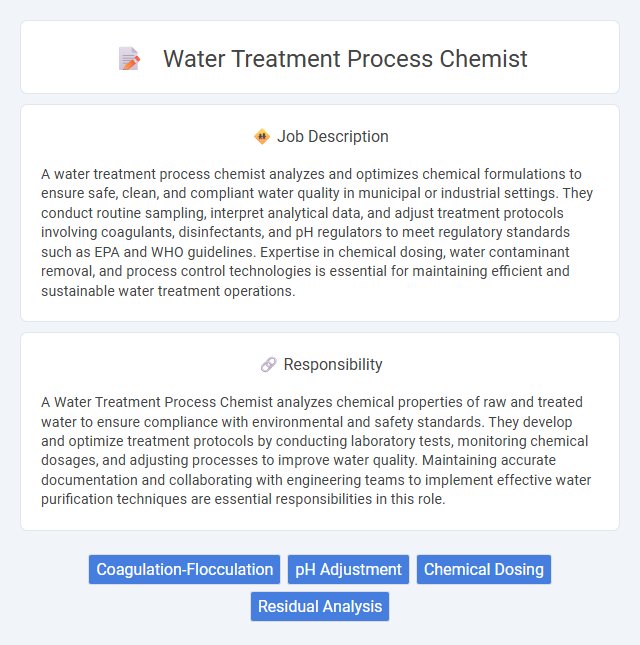
A water treatment process chemist analyzes and optimizes chemical formulations to ensure safe, clean, and compliant water quality in municipal or industrial settings. They conduct routine sampling, interpret analytical data, and adjust treatment protocols involving coagulants, disinfectants, and pH regulators to meet regulatory standards such as EPA and WHO guidelines. Expertise in chemical dosing, water contaminant removal, and process control technologies is essential for maintaining efficient and sustainable water treatment operations.
People with strong analytical skills and attention to detail will likely find a water treatment process chemist role suitable due to the precise nature of chemical testing and monitoring. Candidates who enjoy working in lab environments and are comfortable handling complex scientific equipment may have higher chances of success. Those who prefer routine tasks and have a genuine interest in environmental science might be particularly well-suited for this profession.
Qualification
A water treatment process chemist typically requires a Bachelor's degree in chemistry, environmental science, or chemical engineering, with specialized knowledge in water chemistry and treatment technologies. Expertise in analytical techniques such as spectroscopy, titration, and chromatography is essential for monitoring water quality and detecting contaminants. Professional certifications, such as Certified Water Technologist (CWT), and experience with regulatory standards like EPA and WHO guidelines enhance job qualifications significantly.
Responsibility
A Water Treatment Process Chemist analyzes chemical properties of raw and treated water to ensure compliance with environmental and safety standards. They develop and optimize treatment protocols by conducting laboratory tests, monitoring chemical dosages, and adjusting processes to improve water quality. Maintaining accurate documentation and collaborating with engineering teams to implement effective water purification techniques are essential responsibilities in this role.
Benefit
A water treatment process chemist likely experiences benefits such as enhanced expertise in chemical applications for water purification, contributing to environmental sustainability and public health. They probably gain opportunities for career growth within industries focused on water management and regulatory compliance. The role may also offer competitive compensation and the satisfaction of supporting safe, clean water access.
Challenge
A water treatment process chemist likely faces challenges related to ensuring consistent water quality amid fluctuating raw water compositions and regulatory standards. They probably need to address complex chemical interactions and optimize treatment protocols to prevent contamination and equipment corrosion. The role may demand rapid problem-solving skills to manage unexpected process deviations while maintaining environmental compliance.
Career Advancement
A career as a water treatment process chemist offers extensive opportunities for advancement through gaining expertise in advanced chemical analysis, process optimization, and regulatory compliance. Mastery of water quality standards and proficiency in innovative treatment technologies can lead to senior scientist or management roles in environmental firms or public utilities. Continuous professional development and certification in water treatment process management enhance prospects for leadership positions and specialized consultancy.
Key Terms
Coagulation-Flocculation
A water treatment process chemist specializing in coagulation-flocculation optimizes the removal of suspended particles and contaminants by selecting and dosing appropriate coagulants such as alum or ferric chloride. Mastery of parameters like pH, mixing intensity, and residence time ensures effective formation of flocs, enhancing sedimentation and filtration efficiency. Expertise in monitoring turbidity and zeta potential allows for precise control of the destabilization and aggregation mechanisms critical for water purification.
pH Adjustment
Water treatment process chemists specialize in pH adjustment to ensure optimal water quality by precisely regulating acidity or alkalinity levels using chemical additives like acids, bases, or buffering agents. This control is crucial for preventing corrosion, scaling, and ensuring compliance with environmental regulations. Expertise in titration methods, process control systems, and water chemistry analysis is essential for effective pH management in industrial and municipal water treatment facilities.
Chemical Dosing
A Water Treatment Process Chemist specializing in chemical dosing ensures precise formulation and application of chemicals like chlorine, coagulants, and pH adjusters to optimize water quality and compliance with environmental standards. This role involves monitoring dosing equipment, analyzing water samples for chemical residuals, and adjusting dosages to prevent scaling, corrosion, and microbial contamination. Expertise in chemical reaction kinetics and treatment system hydraulics is critical for maintaining efficient and safe water purification operations.
Residual Analysis
Residual analysis in water treatment process chemistry involves quantifying trace contaminants and by-products remaining after purification stages to ensure compliance with safety standards. Chemists use advanced spectrometry and titration techniques to detect residual chlorine, heavy metals, and organic compounds critical for maintaining potable water quality. Accurate residual analysis supports process optimization and regulatory adherence, preventing potential health hazards from chemical overuse or ineffective treatment.
 kuljobs.com
kuljobs.com